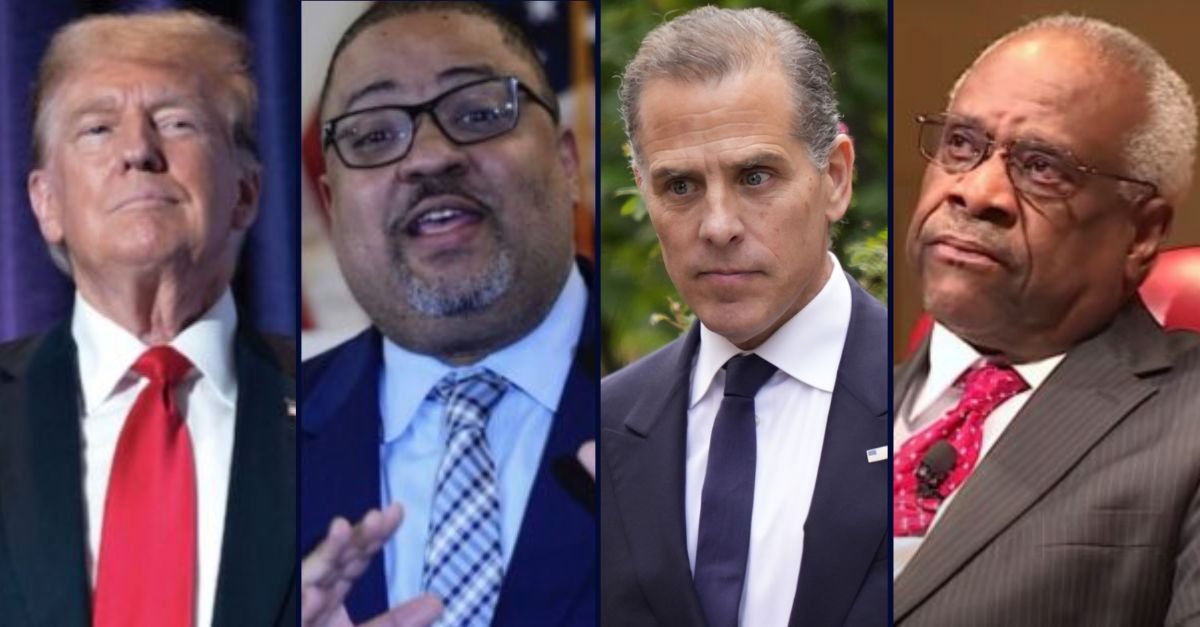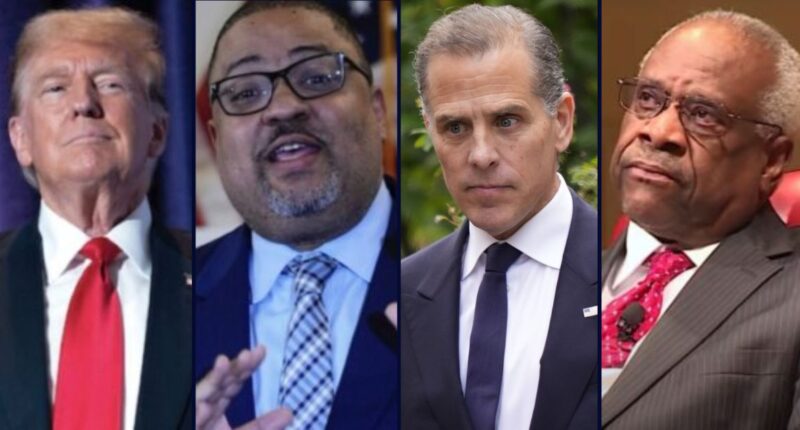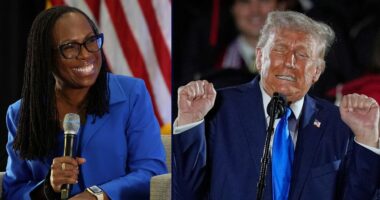
From left to right, the images show Donald Trump speaking at a rally in Green Bay, Wis., on Tuesday, April 2, 2024 (AP Photo/Mike Roemer), Manhattan District Attorney Alvin Bragg gesturing during a news conference in New York on Feb. 22, 2024 (AP Photo/Frank Franklin II), Hunter Biden leaving federal court in Wilmington, Del., on June 11, 2024 (AP Photo/Matt Slocum), and Clarence Thomas (YouTube/Library of Congress).
Attorneys for President-elect Donald Trump on Monday asked the judge overseeing his New York City-based hush-money case to dismiss the indictment and vacate the jury’s guilty verdicts.
In an 80-page filing, attorneys Todd Blanche and Emil Bove say three distinct sources of federal law “require” the defense’s requested “result” and those legal sources “require it immediately.”
But the penultimate filing in the case actually begins with an invocation of current events: President Joe Biden’s pardon of his adult son Hunter Biden’s felony gun conviction and any would-be crimes.
“Yesterday, in issuing a 10-year pardon to Hunter Biden that covers any and all crimes whether charged or uncharged, President Biden asserted that his son was ‘selectively, and unfairly, prosecuted,’ and ‘treated differently,”” the filing, docketed Tuesday, reads.
Trump’s attorneys do not only crib language from the 46th president’s perfidious bout of patrimonial clemency, they also echo the elder Biden’s words targeting the work of federal prosecutors.
“President Biden argued that ‘raw politics has infected this process and it led to a miscarriage of justice,’” the motion goes on. “These comments amounted to an extraordinary condemnation of President Biden’s own DOJ. This is the same DOJ that coordinated and oversaw the politically-motivated, election-interference witch hunts targeting President Trump.”
The filing accuses Manhattan District Attorney Alvin Bragg, a Democrat, of having engaged in “precisely the type of political theater” the president rubbished when he issued his son’s pardon.
Late last month, Bragg’s office made it clear prosecutors intend to push forward and ask for Trump to be sentenced in connection with his 34 felony convictions on charges of falsifying business documents — after he finishes his second term as president in January 2029.
The Damocletian nature of that option is mentioned in the motion.
“With respect to Presidential immunity, it would be egregious and unlawful for this Court to hold the prospect of a 2029 sentencing over President Trump’s head while he continues his service to this Country,” the filing reads. “President Trump would be required to operate ‘under an apprehension that the motives that control his official conduct may, at any time, become. the subject of inquiry’ at a future sentencing.”
Trump’s attorneys go on to say the prospect of a president working under such conditions would “seriously cripple the proper and effective administration of public affairs as entrusted to the executive branch of the government.”
And, so the argument goes, simply putting the sentencing of the case on a shelf in a legal freezer would violate the presidential immunity doctrine created by the U.S. Supreme Court earlier this year.
In the filing, Trump’s attorneys tear into Bragg for having “ignored” the recent vintage immunity doctrine — saying the district attorney’s “hubris on that topic” and “stubborn insistence on offering official acts evidence in grand jury proceedings and at trial resulted in damage to the institution of the Presidency.”
The motion also criticizes the court itself for rushing ahead with the case “despite obviously relevant Supreme Court proceedings.”
Presidential immunity, the motion argues, dovetails with arguments for dismissal sourced from the Supremacy Clause of the U.S. Constitution.
“Local elected officials such as DA Bragg have no valid basis to cause such disruptions, which also violate the Supremacy Clause,” the filing goes on. “Consequently, the federal Constitution is an absolute ‘legal impediment’ to further proceedings, and the case must be immediately dismissed.”
The motion elaborates on this point, at length:
As relevant here, “the Supremacy Clause prohibits state judges and prosecutors from interfering with a President’s official duties.” The Supreme Court has applied the Supremacy Clause in that fashion to federal employees since the 1800s.
…
The Supremacy Clause adds additional urgency to the need for immediate dismissal because DANY has created the nightmare scenario where a local, biased prosecutor is seeking to interfere with the outcome of the national election by encumbering the people’s choice of a leader with unacceptable burdens and distractions.
The third source of federal law cited by the defense is a statute: the Presidential Transition Act of 1963.
“The Presidential Transition Act applies to President Trump,” the motion goes on. “The Act’s legislative history makes clear that there is no material distinction between the President-elect and the post-inauguration sitting President for these purposes.”
Trump’s attorneys, citing precedent, say a presidential transition is effectively part of an incoming administration that implicates the “national interest” as well as the “public function” of the presidency.
This is essentially an argument that as president-elect, Trump is no longer a private citizen because his job already “includes evaluation of sensitive national security issues and associated grave risks.”
“[Bragg’s] insistence on continuing with these unlawful, failed proceedings intensifies the risk associated with that vulnerability,” the motion goes on. “President Trump has already commenced this complex. sensitive, and intensely time-consuming process. which is a ‘monumental undertaking.’ These proceedings are interfering with that process and must therefore be terminated immediately.”
The district attorney’s office has until Dec. 9, to file their response.








